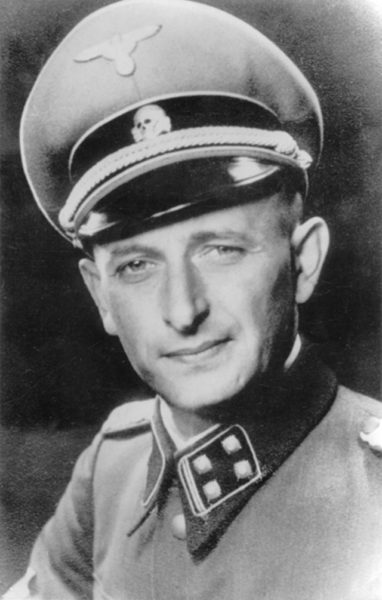Alexander Faludy outlines the horrific “success” of Adolf Eichmann’s activities in Hungary in 1944:

SS-Obersturmbannführer Adolf Eichmann (1906–1962), head of Reichssicherheitshauptamt (RSHA, Reich Security Central Office) Department IV B4 (Jewish affairs), who organized the deportation of Jews to the Auschwitz concentration camp in German-occupied Poland during the Holocaust. Taken in or around 1942, this appears to have been Eichmann’s official RSHA ID photograph.
Photographer unknown, public domain image via Wikimedia Commons.
SS Obersturmbannführer (Lt. Col.) Adolf Eichmann, head of Reich Security Main Office IV.B.4 (Jewish Affairs), arrived at Budapest’s Keleti railway station together with 19 subordinates on 21 March 1944. Just 48 hours had passed since German troops had marched into the country, and a car was waiting to take Eichmann to the city’s Astoria Hotel close to the Pest riverbank. From these incongruously elegant surroundings Eichmann would commence the most feverous episode in the Final Solution of the Jewish question in Europe: the destruction of the Jews of Hungary, the only chapter in its history he was to supervise in person and in full.
For speed and scale the deportations went unmatched: 424,000 people were despatched by train in just 52 days, from 14 May to 9 July. In this fleeting window Hungarian Jews became the single largest group gassed at Auschwitz. The crematoria couldn’t cope with such “over-supply”, and Commandant Rudolf Höß ordered special fire pits dug — filling the camp with noxious smoke. According to Primo Levi, “there were weeks when only Hungarian was heard in Auschwitz”.
Physical annihilation was undergirded by Eichmann’s elaborate psychological strategy. Sophisticated Budapest Jews who might escape or resist were pacified by newspaper reports that only “ost Juden” from Hungary’s nether regions were being removed as “undesirables”. Many only saw through the lie, if at all, when deportations reached Budapest’s outer suburbs in early July — just before Admiral Miklós Horthy, Hungary’s Head of State, halted them under diplomatic pressure from the Western Allies and neutrals.
Throughout the deportations, and across Hungary’s length, Eichmann deluged Jews with ever more complex regulations covering the minutiae of daily life. These instilled a false sense of permanence which inhibited hiding or escape: “why would the authorities go to all this trouble if they were just going to get rid of us?”
Even as deportations rolled on, Eichmann conducted elaborate negotiations for fanciful “rescue schemes” including, but not limited to, the infamous “Blood for Trucks” project involving Rudolf Kastner — the proposed barter of one million Jewish lives for 10,000 Western motor vehicles for use on the Eastern front against the USSR. The aim, Eichmann later acknowledged, was not just to split Western powers from the Soviets, but also to distract Hungary’s Jewish leaders from counter-organising: keeping minds busy and hopes alive.
All the while Eichmann treated Jewish leaders in Budapest to flashes of menace. One day he promised them a return to normality “after the war”, the next he would snarl “Do you know who I am? I am a bloodhound!” With studied cruelty Eichmann arranged the ghettoisation of Hungary’s Jews to begin on Sunday, 16 April: the first day of Passover, 1944.
Eichmann did many things in Hungary; the one thing he did not do was simply “obey orders” — indeed over time he defied them with gathering frequency. That autumn as inevitable defeat became ever more apparent Eichmann, helped by local enthusiasts, intensified his efforts, instigating newly inventive means of eliminating Jews in Hungary and the Balkans through “death marches” and localised killing sprees. In doing so, Eichmann subverted instructions from Himmler who ordered cessation as part of a delusional plan to negotiate with the allies.
This “Eichmann in Budapest” should be recalled while contemplating the later Eichmann in Jerusalem.



